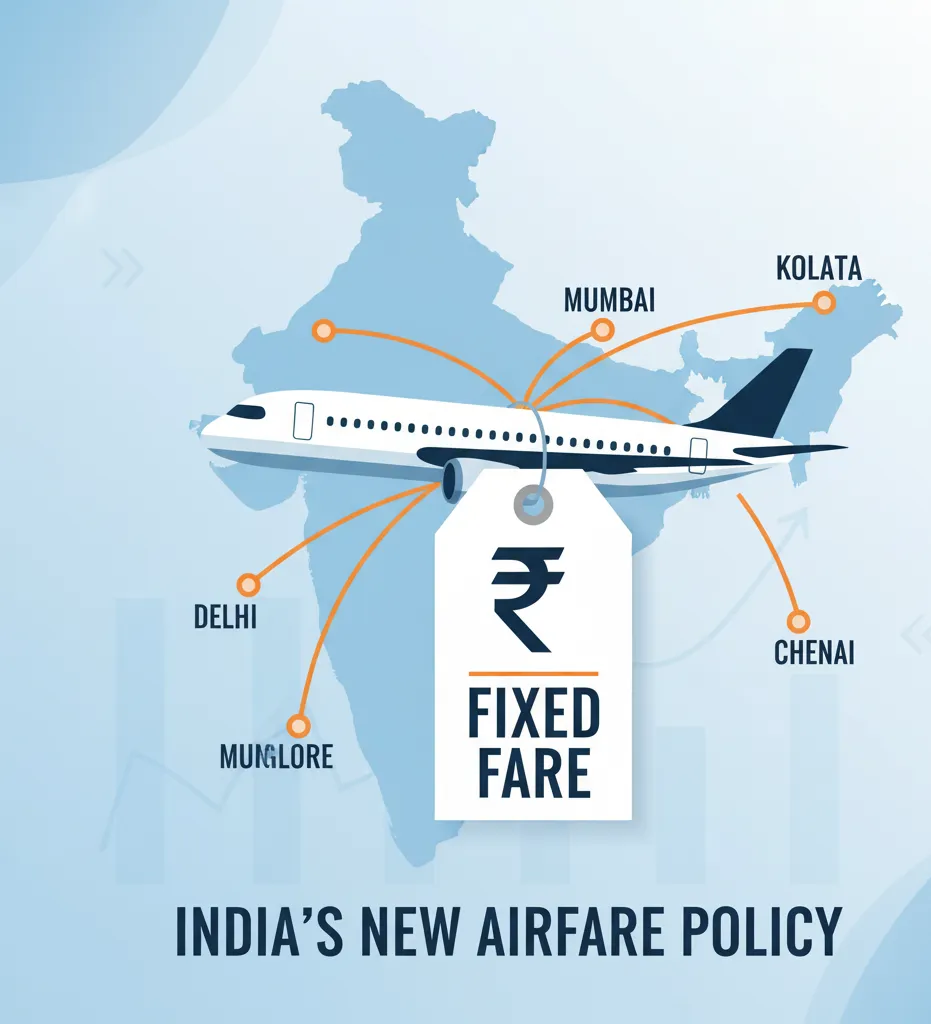India launches “One Fare, One Route” to cap domestic airfares on key routes, ensuring predictable, fixed ticket prices for all bookings.
 Brajesh Mishra
Brajesh Mishra

The Ministry of Civil Aviation on October 14, 2025, announced the launch of “One Fare, One Route”, a fixed airfare scheme aimed at regulating domestic ticket prices on key routes. The policy mandates a uniform ticket price for all passengers on selected routes, regardless of booking time, with implementation set to begin on November 1, 2025.
Under the scheme, 20 high-demand domestic routes — including Delhi–Mumbai, Bangalore–Chennai, and Delhi–Kolkata — will follow a fixed fare structure. This move is designed to address fare volatility that has emerged in recent months as airlines raised prices during peak periods and last-minute bookings.
Civil Aviation Minister Jyotiraditya Scindia said the initiative would “eliminate unfair price volatility and make air travel more predictable for passengers.” Air India CEO Campbell Wilson added that fixed fares would “bolster consumer confidence and strengthen India’s aviation market.”
India’s domestic air traffic surged over 20% in 2025, leading to a sharp increase in fares on popular routes. A parliamentary committee had earlier recommended route-specific fare ceilings to prevent sudden price hikes. The new policy introduces a regulated pricing framework while allowing airlines to bid for routes, ensuring competition and operational sustainability.
The Ministry described the initiative as a “market-based intervention”, where airlines can seek limited viability gap funding under a fixed-fare model. Alliance Air has announced plans to deploy ATR aircraft on some routes, utilizing mechanisms similar to the UDAN regional connectivity scheme.
India’s fare-cap approach aligns with similar measures implemented in parts of Europe and Latin America, where governments introduced fixed or capped fares to stabilize air travel markets. The policy positions India as a regional leader in consumer-centric aviation regulation and may serve as a model for other emerging economies.
The “One Fare, One Route” scheme represents a significant policy intervention in India’s aviation sector, aimed at improving affordability and transparency in ticket pricing. By stabilizing fares on key domestic routes, the government seeks to promote greater accessibility and long-term growth in air travel.
Q1. What is the “One Fare, One Route” scheme?
It is a government initiative that mandates a single, fixed ticket price for selected domestic air routes in India, regardless of when a passenger books their ticket.
Q2. When will the scheme come into effect?
The scheme will be implemented from November 1, 2025.
Q3. Which routes are covered under the scheme?
Initially, 20 high-demand routes will be covered, including Delhi–Mumbai, Bangalore–Chennai, and Delhi–Kolkata.
Q4. Will private airlines also follow the fixed fare?
Yes. Both state-owned and private airlines selected through a bidding process will operate on these routes under the fixed fare structure.
Q5. How is the fixed fare decided?
Airlines will bid for the lowest required subsidy, and the Ministry of Civil Aviation will set a uniform fare based on the bids and operational cost benchmarks.
Q6. Will this scheme affect flight availability?
The government expects flight availability to remain stable. Airlines may need to adjust capacity and seat allocation, but passenger accessibility is expected to improve.
Q7. Can fares still change due to peak season or last-minute booking?
No. Once fixed, the fare on selected routes will remain the same regardless of booking time or travel date.






Sign up for the Daily newsletter to get your biggest stories, handpicked for you each day.
 Trending Now! in last 24hrs
Trending Now! in last 24hrs